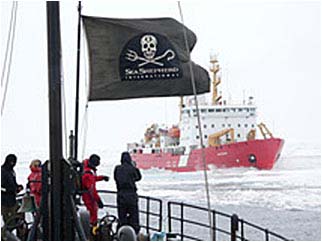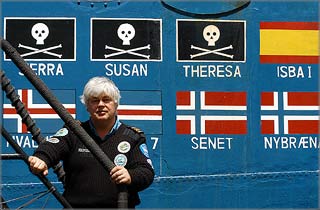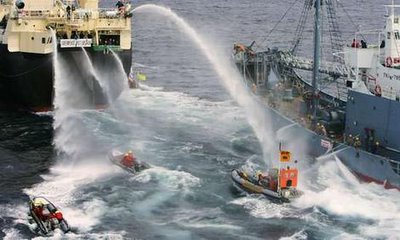
'Use a pirate to stop a pirate' is Paul Watson's motto. Watson captains the Farley Mowat, flagship of the conservation group Sea Shepherd, and his latest Antarctic campaign against Japanese whalers is running into its third week. The Japanese vessels are hunting in waters claimed by Australia, ostensibly under the 'scientific research' exception to the IWC's global whaling moratorium.
For someone who disclaims illegal methods, Watson seems to revel in the label 'pirate'. His ship flies an eco-friendly Jolly Roger, with the crossed bones replaced by Neptune's trident and a shepherd's staff, and the skull bearing a whale and dolphin in yin-yang arrangement. He tries unconvincingly to claim piracy's romantic image in an opinion piece in today's Age, notable for its shaky grasp of Caribbean history and international law. And he keeps a visual tally of vessels sunk - yes, sunk - by the Farley Mowat.

Watson with the Farley Mowat's 'killcard'
(SMH)
Sea Shepherd sits squarely on the green movement's vigilante fringe. The organisation's mission statement is to enforce international conservation law; its disavowal of violence doesn't sit well with the list of vessels sunk or scuttled by Watson and colleagues, proudly advertised on other pages of Sea Shepherd's website. None of this, needless to say, is sanctioned by the 'international law' whose authority Sea Shepherd claims; individual criminal responsibility remains with few exceptions the province of domestic law, which in Australia forbids the sinking of other people's boats. But facts have never mattered for ideologues, whether of the Left or Right.
"What we do is dangerous but it is also legal and non-violent ... We are upholding international conservation law. (The Japanese) are criminals and they don't have any justification for what they are doing."
"The message Australia is sending is, 'if you are rich enough, you can break the law'," [Watson] said. "You need pirates to stop pirates; you can't depend on governments. If they were doing their job, we wouldn't have to do this."
It's depressing that as the 21st century gets under way, "end justifies means" thinking is coming back into fashion (did someone say "Iraq?" "Rendition?"). I once thought that Greenpeace pushed the envelope in the service of worthy causes, but they're model citizens next to the Sea Shepherd crowd. Watson himself was booted out of Greenpeace, which explains why he isn't coordinating with their two vessels in the present game of chicken being played across the Great Southern Ocean.

Greenpeace and Japanese whalers exchange season's greetings
(Age)
If I'm giving inordinate attention to what is, after all, a relatively innocuous group in a stifetorn world, it's because they display the same blinkered, unreasoning, tar-with-one-brush mentality that riled me during the Van Nguyen affair. That seems, in fact, to fasten on any issue thrown into the political arena and convert debate into diatribe. Take these quotes from Activist Cash (which admittedly is hardly a nonpartisan source) -
Of his native Canada, Watson has said he “despise[s] its government and dislike[s] its people.” Scandinavians, meanwhile, are “the children of the rapers of Ireland and executioners of the Celts.” The “bloodlust of these Viking offspring” who hunt whales made him “ashamed” of his Danish ancestry. And Watson once shouted through a megaphone at Makah Indians on a whale hunt: “Just because you were born stupid doesn’t give you any right to be stupid.”
Writing this post, I pondered whether pitting greed and power against cranks and fanatics is another feature of 21st century politics. But then I thought back over history, and realised that things haven't changed that much.

1 comment:
presumably because one of his victims was Spanish-flagged; I guess not all European whalers are blood-lusting Scandinavians).
Holding ideas sacred is what distinguishes ideology from rational analysis. If the ecologues paused to think (or read), they'd realise that the animist beliefs of 'primitive' peoples didn't stop them killing animals when necessary. That's not to argue that contemporary Japanese whaling is necessary....
Post a Comment